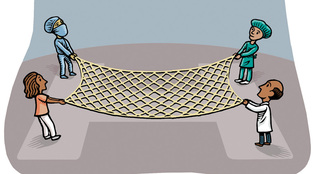 loading
loading
FindingsHow to make hospitals safer Gregory NemecView full imageBetter medical care doesn't always depend on technological breakthroughs. For a new Yale study, researchers developed a suite of simple safety practices for the obstetrical unit at Yale-New Haven Hospital -- and found that they drastically improved patients' well-being. Doctors, nurses, midwives, and staff had team training seminars for better communication. In the fall of 2004, researchers from the hospital and the medical school invited independent hospital safety experts to assess the obstetrical unit. Then, says Christian Pettker, assistant professor at the Department of Obstetrics, Gynecology, and Reproductive Sciences and lead author of the study, the researchers used the assessment to find ways "to make patient safety a priority of the unit." They developed protocols and guidelines for a variety of clinical procedures, from admission criteria for patients to dosing standards for drugs. They implemented a computerized program that staff members could use to report medical errors and near misses anonymously. They hired a new nurse dedicated to patient safety issues. And they required doctors, nurses, midwives, and staff to complete team training seminars for better communication. "That's a very important part of the patient safety movement -- to get people who really have different ways of communicating to understand one another," says Pettker. For three years, from September 2004 through August 2007, the researchers tracked "adverse patient events," ranging from unexpected blood transfusions to serious maternal or neonatal injury. They found that staff members perceived a 30 percent improvement in overall safety after the new measures were put in. But the actual results were even better: the rate of adverse events decreased by 60 percent. (The study appeared in the May American Journal of Obstetrics and Gynecology.) Many of the changes could easily be adopted by hospital units in other medical specialties. For the obstetrical unit, the next task is to make sure the changes stick. "The important thing with something like this is that you can't stop just after you've improved things," says Pettker. "It constantly needs attending to."
The comment period has expired.
|
|